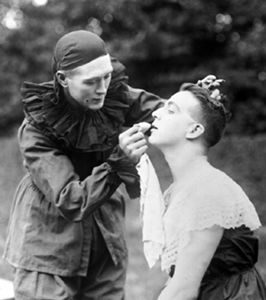Cet article a été initialement publié dans le magazine Macleans (22/07/2013)
Katie Stelmanis, the operatically trained singer of Canadian electro band Austra, says that for her, singing is a full-body experience. When you possess a soaring tremolo voice like hers, of course it would be. But on Olympia , her second album leading the band—following up 2011’s Feel It Break , which was shortlisted for the Polaris Prize and hailed as album of the year by New York magazine—Stelmanis wanted a different kind of full-body experience. She found it on the dance floor. For a classically trained musician who didn’t even listen to pop music until she was almost out of high school, understanding how to work with rhythm took some time. “Coming out of a classical world, that didn’t factor into my brain,” says Stelmanis, calling from the back of a van somewhere between Paris and Berlin. “Now that I appreciate the strengths of what rhythm and bass can do to a song, I can’t really go back. It’s a different kind of learning, developing an ear for a sound I’d never had before.”
It’s not uncommon to hear gigantic voices in disco or electro-pop; many, if not most, of the great singers of the genre come from soul, gospel and R & B. What makes Stelmanis unique is her operatic tone, which can be an acquired taste; harsh critics might term it shrill. For more receptive listeners, it’s endearing—and, arguably, inspiring—to hear what sounds like a nerdy, sombre classical student let loose over music that could be a Madonna single—albeit one in a minor key, which is Austra’s stock in trade.
Not that Austra will ever be mistaken for Madonna, even if much of the band’s sound does date from the same era. Their last record was described by many critics as “darkwave,” or goth-tinged electro dance music that owes more than a few debts to ’80s icons such as New Order. That wasn’t intentional.“I still don’t listen to a lot of bands I’m compared to,” says the singer, born in 1985. “I made my music on a computer using these synth sounds because that’s what was available to me; it’s not because I wanted to make music like synth music in the ’80s.”
In that decade, synth music—whether it was Donna Summer, Depeche Mode or Erasure—was the soundtrack to gay subculture, closeted and otherwise. Synths have always conveyed a sense of created identity, of possibility—not unlike, say, the opera Stelmanis grew up singing with the Canadian Children’s Opera Company in Toronto. Austra’s music—with its combination of operatic melodrama and dance culture, and its mysterious, minor-key synth sounds—lands in an era where synth pop is much more mainstream. But the band still resonates profoundly with gay audiences, in part because most of its members identify as queer. “When I was young, I would absolutely go see any band I knew who had a lesbian in it,” says Stelmanis. That’s all the more true in smaller centres on Austra’s tour schedule—cities in eastern Europe or Prairie towns such as Saskatoon, home of Austra keyboardist Ryan Wonsiak, places where Stelmanis says the band has played some of its best shows.
Austra has found a wider audience, too. During its two years on the road promoting Feel It Break , the band evolved into a powerful six-piece that includes twin sisters Sari and Romy Lightman on backing vocals, bassist Dorian Wolf and electronic percussionist Maya Postepski. They opened stadium shows in Europe for Beth Ditto’s Gossip and toured with buzzy minimalists the Xx—two acts that, like Austra, have queer women fronting a band where sexual identity is not the driving force.
“Most queer bands, their lyrics are either sexually driven or politically driven,” Stelmanis says. Austra’s are neither.
The live show brought about some shifts: “Our record was pretty dark and our live show was a celebratory dance party,” she says. Olympia bridges the gap. Stelmanis also didn’t take lyrics seriously. Now, she says, “I was making music to sing for people, and I felt I could perform better having real lyrics. I’ve always loved covering songs that have a narrative, like Roy Orbison’s Crying or Carole King’s Natural Woman . It’s such a pleasure to sing a song with a storyline or an idea.” On Olympia , it’s an even greater pleasure to dance to it.
Maclean's July 22, 2013

 Partager sur Facebook
Partager sur Facebook Partager sur X
Partager sur X Partager par Email
Partager par Email Partager sur Google Classroom
Partager sur Google Classroom


